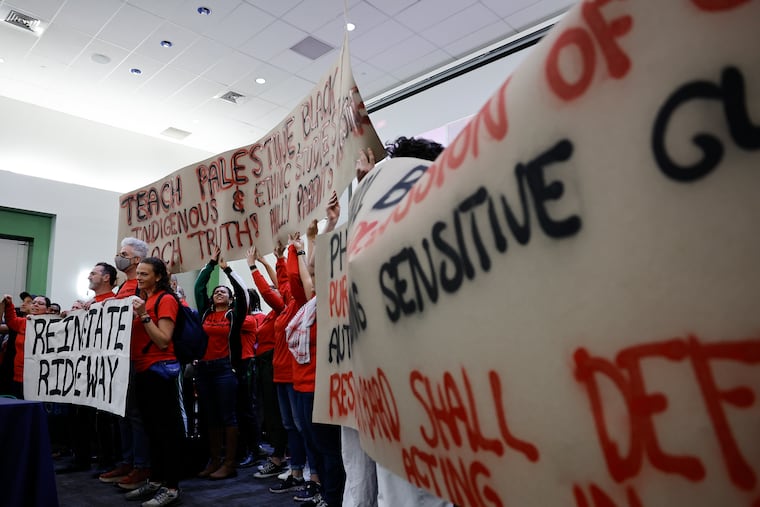Protesters shut down a Philly school board meeting. Then board members voted. Was that legal?
“We needed to conduct the business of the school district on behalf of the children,” school board president Reginald Streater said.

After protesters on Thursday night took over a meeting to demand the return of a popular teacher to her classroom, the Philadelphia school board removed themselves from the room where 30 people clutched giant banners, chanted and seized a microphone.
A half-hour later, the nine-member board reconvened but behind a locked door. Members of the public and the media who asked for access to the meeting were denied, though the meeting was live streamed. The board voted on its entire agenda, including approving two Keystone Opportunity Zones, which give tax breaks to developers.
“We needed to conduct the business of the school district on behalf of the children,” Reginald Streater, the school board president, said on Friday.
» READ MORE: Supporters of a disciplined Northeast High teacher disrupt Philly school board meeting
Because public comment had already concluded when the disruption happened, Streater said he made the call “to recess the meeting and reconvene at a place in the school district where the public could still see everything, hear everything virtually and on [the public access station].”
A legal expert said that the board’s move was problematic.
The Sunshine Act requires meetings by government bodies be held in public. While Melissa Melewsky, media law counsel for the Pennsylvania NewsMedia Association, said offering live streaming and television access are additional ways to allow people to access meetings, those formats are not considered the meeting. (The Inquirer is a member of the Pennsylvania NewsMedia Association.)
“This situation raises significant Sunshine Act compliance issues, creates potential liability under the act and runs counter to the public interest,” said Melewsky. “There’s nothing in Pennsylvania law that allows a virtual-only meeting.”
Meeting disruptions are not unprecedented, but the route the Philadelphia board took is unusual, Melewsky said — rather than dealing with the protesters, the board shut out everyone, including members of the public who had nothing to do with the demonstration.
“It creates a bit of a slippery slope — how often will they do this? Every time they don’t like what they’re hearing?” said Melewsky. “I think that’s unreasonable, especially in regard to shutting out the press, who stand in the shoes of the public.”
Thursday was not the first time the board recessed and then reconvened privately. In 2019, protesters, including students, shut down a meeting after the school board voted to mandate metal detectors in all Philadelphia high schools.
Then-board president Joyce Wilkerson halted the meeting after demonstrators said they did not recognize the board’s legitimacy and a protest leader used profanity. The board soon continued its meeting behind closed doors.
Streater said people have a First Amendment right to voice their displeasure, but “the expectation is everybody in that space will comport ourselves in a way where we can all utilize the shared space in a productive and meaningful way in the best interest of our students.”
What’s next?
Leaders of Philadelphia Parents for Palestine, the group that organized the demonstration and disruption, said that members of the new and growing group have not yet figured out next steps.
But supporters of Keziah Ridgeway, the Northeast High teacher who was removed from her job because of personal social media posts and activism around Palestinians and the war in Gaza, said they will not back away from their demands to reinstate Ridgeway.
Jethro Heiko, one of the group’s organizers, said he was moved to act after repeated testimony yielded nothing.
“They’ve not responded in nine months,” Heiko said.
The board’s next action meeting is scheduled for Nov. 21.
Ridgeway, an award-winning social studies, anthropology and Advanced Placement teacher, was the subject of a complaint by the Jewish Federation of Greater Philadelphia. She has been accused of using her position to teach anti-Israel views and threaten some Jewish parents via her personal social media accounts, including one with a gun emoji.
Ridgeway was removed from her classroom shortly after the complaint was filed. An investigation is underway; it’s not clear what the timeline regarding any discipline is going forward.
Rouz Lami, a member of Philadelphia Parents for Palestine and mother of five children, three of whom are currently students at Northeast, said Ridgeway’s loss is keenly felt at the school, particularly by the school’s significant Palestinian population.
“She was very supportive to our kids,” said Lami. “Ms. Ridgeway is a wonderful teacher.”
When she was growing up, Lami said, “I was taught to hush about being from Palestine. I was told, ‘Say you’re from Jordan,’” said Lami. But her children are different — proud of being Palestinian, unafraid to talk about it. The discipline against Ridgeway is terrifying, both to her children and to her, Lami said.
“This is exactly what we were raised to be afraid of,” said Lami. “If Ms. Ridgeway doesn’t go back, what does that show our kids? It shows you really have to stop talking about Palestine or you can lose your job.”